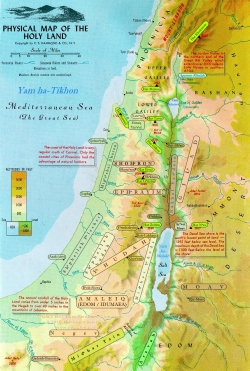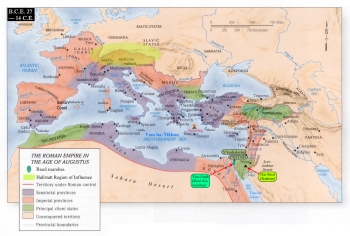wa-Yishelakh 7th Eve (ËrꞋëv Sha•bâtꞋ)
Ha•phᵊtâr•âhꞋ
The vision of O•vadᵊyâhꞋ

(We Nᵊviy•imꞋ have heard from é‑‑ä a shᵊmu•âhꞋ.![]() An envoy has been sent among the goy•imꞋ inciting: "Get up!!! Let's get up âl•ëy•hâ,
An envoy has been sent among the goy•imꞋ inciting: "Get up!!! Let's get up âl•ëy•hâ,![]() and wage war!!! )
and wage war!!! )
 |
"Look Ë•dōmꞋ, I have constrained you to be tiny among the goy•imꞋ. You're a horribly despicable inciter! The arrogant presumptuousness of your heart has carried you away – perceiving yourselves to be neighbors of the cracks in the rocky heights, the settling-place of one who says in his heart, 'Who's going to bring me down to earth?'
"Though you may elevate yourself with the eagle or place your nest among the stars, I will bring you down to earth!
"How was Ei•sauꞋ searched, his secret caches exposed? Your allies, who ate at your table, betrayed you! The day I bring you down to earth, won't I destroy the sages from Ë•dōmꞋ? And understanding from Har Ei•sauꞋ? Out of the bullying your brother, Ya•a•qovꞋ shall you be covered in shame – and excised forever. On the day![]() you stood by; on the day strangers captured Ya•a•qovꞋ's ramparts, and foreigners came to his gates and cast lots over Yᵊru•shâ•laꞋyim—you were one of them too! You shouldn't have seen on the day of your brother, on the day of his estrangement; nor rejoiced over Bᵊn•eiꞋ-YᵊhudꞋâh on the day of their loss, nor boasted with your mouth on the day of their strait.
you stood by; on the day strangers captured Ya•a•qovꞋ's ramparts, and foreigners came to his gates and cast lots over Yᵊru•shâ•laꞋyim—you were one of them too! You shouldn't have seen on the day of your brother, on the day of his estrangement; nor rejoiced over Bᵊn•eiꞋ-YᵊhudꞋâh on the day of their loss, nor boasted with your mouth on the day of their strait.
"You should not have come in the gate of My am on the day of their subjugation. Nor should you have blocked their escape nor handed over their refugees to their conquerors. For Yom é‑‑ä is near, upon all of the goy•imꞋ. As you have done, so shall it be done to you. What you've rendered shall be returned upon your head. For when you drank on Har Qâ•dᵊsh•iꞋ, all of the goy•imꞋ drank continually – drinking and swallowing.![]() But, on Yom é‑‑ä, they shall disappear like they had never existed. And on Har Tzi•yonꞋ there shall be refugees, and Har Tzi•yonꞋ shall become qoꞋdësh. Then Beit Ya•a•qovꞋ shall realize their legacy.
But, on Yom é‑‑ä, they shall disappear like they had never existed. And on Har Tzi•yonꞋ there shall be refugees, and Har Tzi•yonꞋ shall become qoꞋdësh. Then Beit Ya•a•qovꞋ shall realize their legacy.
"Then Beit Ya•a•qovꞋ shall be a fire, and Beit Yo•seiphꞋ shall be a tongue of flame. But Beit Ei•sauꞋ shall be the straw in which their fire is kindled, and it shall burn up Beit Ei•sauꞋ. There shall be no survivor to Beit Ei•sauꞋ – for é‑‑ä has spoken.
"Those who live in the NëgꞋëv, along with those of the Shᵊpheil•âhꞋ and the Pᵊli•shᵊt•imꞋ, shall take possession of Har Ei•sauꞋ along with the field of Ë•phᵊr•aꞋyim and the field of the Shom•ronꞋ while Bin•yâ•minꞋ shall take possession of the âÌÇìÀòÅã.
 |
"Those of this northern rampart of the Ten Tribes of Bᵊn•eiꞋ-Yi•sᵊrâ•eilꞋ (who were deported from among the Kᵊna•an•imꞋ as far as Tzâ•rᵊphatꞋ),![]() and the deportees of Yᵊru•shâ•laꞋyim (who are in Sᵊphâ•radꞋ) shall take possession of the cities of the NëgꞋëv.
and the deportees of Yᵊru•shâ•laꞋyim (who are in Sᵊphâ•radꞋ) shall take possession of the cities of the NëgꞋëv.
"Then military-saviors shall ascend Har Tzi•yonꞋ to adjudicate-mi•shᵊpâtꞋ upon Har Ei•sauꞋ – and the kingdom shall belong to é‑‑ä."

Optional parental preparation:
shᵊmu•âhꞋ – This is the only fem. n. used in this verse, which becomes essential when identifying what noun is modified by a fem. pronominal suffix in the next stich.

âl•ëy•hâ – No one seems to have paid attention–ever–that this fem. pronominal suffix, "her," has to refer back to a fem. n. used earlier. Therefore, this suffix cannot refer to Ë•dōmꞋ, which is a masc. n. – consistently and repeatedly confirmed in the verses that follow. Nor is this a trivial error of punctuation that might be ascribed to the Masoretes, since the masc. suffix would have required different consonants as well (namely, òìéå). Thus, the Nâ•viꞋ cites an ongoing incitement among the goy•imꞋ to war not against Ë•dōmꞋ, a masc. n., but "over her" – over the shᵊmu•âhꞋ (the only fem. n. in context) – namely, "over this report" going around among the goy•imꞋ, inciting war!!! In such case, the Nᵊviy•imꞋ often assumed "her" (in this case, "report of war against") to refer to (an inciting report by Ë•dōmꞋ touting war) against Yᵊru•shâ•laꞋyim (a fem. n.)

The day – B.C.E. 586, Babylonian Siege Under Nᵊvu-khad-nëtz•arꞋ

Swallowing – Mᵊlâkh•imꞋ Beit 25.3; Eikh•âhꞋ 4.4, 5, 9.

Tzâ•rᵊphatꞋ – Because this place name, Tzâ•rᵊphatꞋ, is a hapax legomenon in Ta•na"khꞋ, which may refer either to Tzâ•rᵊphatꞋ, Lebanon (see Physical Map of the Holy Land) or the Hallstatt region of France, the second place name mentioned, Sᵊphâ•radꞋ, is the best indicator identifying these two places. While there is no known reference to any village named Sᵊphâ•radꞋ in the Biblical Levant, "It is believed that Jews have lived in Spain since the era of King Solomon (c.965-930 B.C.E.)" (www.jewishvirtuallibrary.org/jsource/Judaism/Sephardim.html; 2015.12.18). The Hebrew term for Spain is Sᵊphâ•radꞋ. Writing ca. B.C.E. 590, O•vad•yâhꞋ ha-Nâ•viꞋ almost certainly referred to the Mediterranean coastal region of Iberian east-coastal Spain. Accordingly, the other corresponding region is likely the Hallstatt region of eastern Gaul (modern France) rather than resettling a large population of expelled Jews into a tiny village in Lebanon (requiring directions relative to a major city even in contemporary times) that archeologists can't even find today.

Questions you might anticipate that your child might raise and be prepared to discuss:
- What is a metonym?
- What is an envoy?
Google+ registered author & publisher

